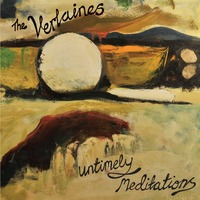Artist: the Verlaines
Album: Untimely Meditations
If you’ve heard of New Zealand’s the Verlaines, it’s probably for their 1980s work. I’m not sure how useful that’ll be for a discussion of their current work (I’m reviewing their excellent 2012 Untimely Meditations but am also a  fan of 2008’s Pot Boiler and 2010’s Corporate Moronic). The people who reviewed those early albums for AllMusic talk of them as “complex” and “fastidious” albums aided by “perfectly realized brass, woodwind, and string sections”, which reads like the Verlaines I know. But to me, those early YouTube vids show a bunch of young guys playing fast but ordinary guitar-led jangle-pop, with singer Graeme Downes awkwardly half-shouting in a voice that’s only begun to hint at craft or depth. I’m prejudiced against jangle-pop; bet on AllMusic against me on this one.
fan of 2008’s Pot Boiler and 2010’s Corporate Moronic). The people who reviewed those early albums for AllMusic talk of them as “complex” and “fastidious” albums aided by “perfectly realized brass, woodwind, and string sections”, which reads like the Verlaines I know. But to me, those early YouTube vids show a bunch of young guys playing fast but ordinary guitar-led jangle-pop, with singer Graeme Downes awkwardly half-shouting in a voice that’s only begun to hint at craft or depth. I’m prejudiced against jangle-pop; bet on AllMusic against me on this one.
American Music Club, and the solo works of their leader Mark Eitzel, strike me as a much better starting point, one I’ll explain. Downes, like Eitzel, is a misanthrope with an eye for detail and a world-weary tenor. Downes, like Eitzel (but even more so), writes and sings long, winding melodies full of jazz chordings and unlikely chord changes. Sometimes they resolve into a sing-along; sometimes they’re too restless to.
The Verlaines, like the American Music Club, can rock out — and make quite the clamor when they choose — but also slip in and out of jazz, country, and music hall formats (Kurt Weill is another likely influence). My favorite songs from Corporate Moronic include one like a darker-than-average Broadway showstopper (Rootless Cosmopolitan), one that’s a bit drunk-by-the-pool-while-summoning-the-slaves-ward of Alabama Song a.k.a. “Show Me the Way to the Next Whiskey Bar” (Paritai Drive), and one, the witty Cole Porter-ish the Way I Love You, that seeks and deserves to be a much-covered pop jazz standard for the next fifty years.
Another comparison might help with Untimely Meditations in specific. Imagine Steely Dan if, instead of polishing each detail into gleaming perfection, they put the same effort – and mostly the same musical instruments – into trapping the listener in sonic barbs, burrs, and thistles. It’s easily the busiest album the Verlaines have made, one of the busiest pop records I’ve ever heard. Virtually every song has a catchy guitar riff, and good rock drumming (or even handclaps), but also intricate guitar solos, and horn charts, and complex organ melodies. Often, all five elements interplay while Graeme Downes sings. Sometimes – not rarely – they clash and make dissonance.
Pets is the catchiest new song I’ve heard all year, triumphantly sung while the guitar and organ play sparkling hooks that chase each other happily; but even there, parts of the song drag low organ drones behind them, muttering for attention. On the Patches is this year’s bid to be a jazz-pop standard, especially when Downes and his piano brightly refrain about “learning to try to love the world again”, and also while smooth saxophone assists the strut of the verses – but again, half the time there’s someone playing what might fit better in a solo piece at a New Music conservatory recital. Plus, both Pets and On the Patches mostly refuse to spend one entire sentence without changing keys, and no matter how I tell you that these marvelous songs run through my head for hours, they’re not how Norah Jones works.
A Call from Decades Past, to be fair, is calmer and steadier. Born Again Idiot bristles with punk energy and clarity; the stomping James, Jimmy, Nuisance, Hemi has a melody almost anyone could sing; the sung-spoken Last Will and Testament is warped blues; What Sound is This? has a refracted propulsion like U2’s Bullet the Blue Sky and lovely faux-aboriginal singing like Enigma’s old hits. I’m trying to balance the messages “This is pop” and “This is complicated”, because we often think of them as opposites, and I honestly don’t know how having five simultaneous melodies (each shifting restlessly) will play in your brain. For me, it makes a record I return to over and over, always in wonder.
The lyrics are smart and aggressive. On the Patches could be re-arranged til it *did* sound like Norah Jones, but that wide-open chorus is led to by thoughts like “We’re all just one walking pharmacy, God’s farcical pharmacy/ and the history of the human race is a history of self-medication…/ in the continuum, it’s equilibrium that we’ve sought/ I’d’ve thought, not a good argument for Intelligent Design/ unless She’s a sadist”. Pets is an attack on women who buy dogs as accessories and conversation starters, and might for all I know be provoked by something, but I enjoy thinking it’s totally unhinged. Dark Riff attacks the entirety of history, from our amphibian ancestors to our evolved psychology to Henry Ford. Diamonds and Paracetamol is personal and loving, and attacks mostly the inadequacies of Graeme Downes, but Last Will and Testament is a long, grumpy left-wing broadside against all the forces in the world that disagree with Downes.
It could be off-putting. But music throughout the record proves he finds joy in the world, and can work with some of its people. His songs are idiosyncratic protests, but he doth protest too much. To be believed, that is. Not to be enjoyed.
– Brian Block
To see the rest of our favorites, visit our Favorite Albums of 2012 page!
